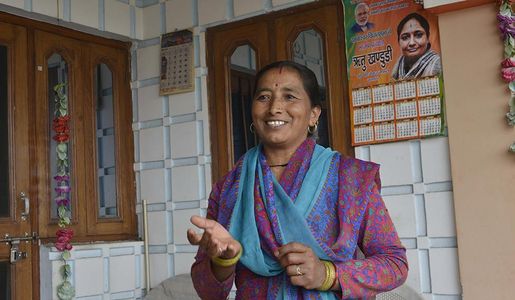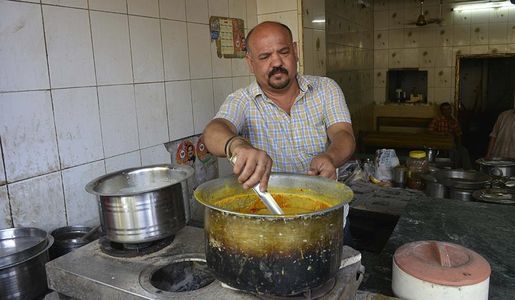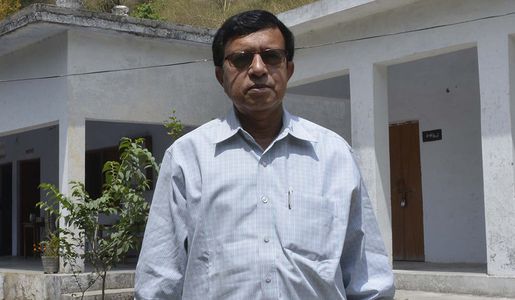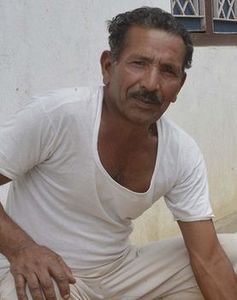Shashi Singh’s promotion to Class five came with a pleasant responsibility: she would escort her brother Ajay to the government school, a kilometre from their Panchur village in Pauri Garhwal, Uttarakhand. He was five years her junior, and they happily meandered through the Sal forests on the way, and she would often drop into his class to see that no one bullied him. In the evenings, five siblings—two more would join years later—sat around a wick lamp and read aloud, while their mother cooked dinner after spending the day in the fields and tending cows.
Electricity came to their village—a cluster of just a few houses—in 1982 when Ajay was 10. His father, Anand Singh Bisht, who worked in the forest department, was the first in the area to buy a TV, a Philips black-and-white set. People from nearby villages thronged his house to watch Ramayan, the epic telecast every Sunday at 9.30am in 1987-88.
On Diwali, father would gather all children to take pictures. “Ajay was precocious, and focused on studies,” said Shashi. “He changed different schools and went to college in Kotdwar and later in Rishikesh. He was very fond of children. On his way back from college, he would drop into my house to meet my daughter, his pocket full of toffees.” She now stays with her husband and children in Kothar village, 30km from Panchur.
Ajay was closest to Shashi, as two other sisters—Pushpa and Kaushalya—were older than him by 16 and 9 years. One of his brothers, Manendra Singh, was two years his senior, and two other brothers were born almost a decade after him.
 Shashi Singh, sister | Arvind Jain
Shashi Singh, sister | Arvind Jain
Yet, since 1994, the favourite sister has met Ajay only thrice, and they have not spoken a word to each other. Though she sends him rakhi every year, she does not know whether he ties it on his wrist.
It was in 1994 that Ajay Singh Bisht became an ascetic—without informing his family. He joined the Nath Sampradaya, a faith named after Guru Gorakh Nath. He shaved his head, got his ears split to wear large earrings, donned saffron robes, and took a new name—Yogi Adityanath—at the age of 22.
He was no longer a brother or a son, but the future Mahant ji or Maharaj ji, as even his family members address him now. They bow before him, and everyone except his parents touches his feet.
Gorakh Nath, the 11th century ascetic, had a following across India. He influenced the Bhakti movement and the country’s syncretic traditions. The Punjabi folklore Heer-Ranjha mentions the lost lover Ranjha becoming a kanphata yogi (ear-split yogi) after meeting Gorakh Nath. There were even Muslim yogis in the Nath faith, which leaned towards hardline hindutva during the time of Mahant Digvijay Nath [1894-1969] and his successor Mahant Avaidyanath [1921-2014]. The two mahants spearheaded the Ram Janmabhoomi movement in Ayodhya and were elected to the Lok Sabha on Hindu Mahasabha tickets. Avaidyanath later joined the BJP.
[Kanphata yogis are known for their steely sternness. The steel reflects the double-edged knife that splits the yogi’s ears during his initiation ceremony. It is not the earlobe that is split, but the cartilage of the central hollow of the ear. They believe that the inch-long incision will help ascetics acquire yogic power.
 Birendra Bahukhandi, classmate | Arvind Jain
Birendra Bahukhandi, classmate | Arvind Jain
[Before the ceremony, “The knife is driven into the ground, or laid down before him, and the candidate takes the necessary vows over it, swearing not to engage in trade, not to take employment, not to keep dangerous weapons, not to become angry when abused, not to marry, and to protect his ears,” writes George Weston Briggs in the book Gorakhnath and the Kanphata Yogis, which was published in 1938.
[The book says, “A Yogi must protect himself from having his rings torn out. In the old days he, whose ears had been mutilated, did not survive; he either died outright or was buried alive… Even now a Yogi with mutilated ears cannot face the world. He must flee from his brethren; he must never be seen again; he is excommunicated; no tomb is erected over the body when he dies; others will not associate with him; and he is not allowed to share in religious ceremonies, and he loses his pujari rights.”]
It was Mahant Avaidyanath who initiated Ajay into the faith. Ajay came under his influence while in college, and they belonged to neighbouring villages.
Today there is a spring in 84-year-old Anand Singh’s steps. After his son became chief minister of Uttar Pradesh on March 19, this retired forest ranger has been given ‘Y category’ police protection, but the family remains unassuming and simple, as Yogi has always remained aloof from them.
Anand Singh is proud of his son; Ajay was studious and wanted to serve society. But his son’s disappearance from college and his renunciation are the most painful chapter in the family’s life.
 Aftab Ahmed, college principal | Arvind Jain
Aftab Ahmed, college principal | Arvind Jain
The father was the first to know about it, several months after the son made the plunge. Ajay was pursuing MSc (Mathematics) at Lalit Mohan PG College, Rishikesh, and the final exams of the second year were just a few months away. Anand Singh travelled to Gorakhpur to check for himself the rumours he had heard. On seeing his son dressed in saffron and the ears split, his heart broke—he wept bitterly. He told Ajay that he did not approve of his decision.
“When children become adults, we should let them decide their future,” Anand Singh told me at his modest single-storey house two weeks ago. Over the years, the house has been cemented, but in some rooms the floor and walls are still plastered with a mixture of mud and cow-dung.
For Anand Singh, the toughest test was to break the news to his wife. “When I told her, she cried a lot...,” he said, choking. He could not complete his sentences.
He continued, after wiping his tears: “I then took her to Gorakhpur and showed her statues of all the gurus. Their parents also would have had to let their sons go, I told her. We should let our son do whatever he wants.”
Mahant Avaidyanath consoled them saying he had taken only one of their sons and that they had three others. And that their son would visit them during festivals and they could meet him whenever they wanted.
 Manmohan Singh, cousin | Arvind Jain
Manmohan Singh, cousin | Arvind Jain
Said Ajay’s cousin Manmohan Singh: “Avaidyanath ji had asked him to inform his parents about his decision. He wrote a letter, but never posted it.”
Shashi could not accept the loss of her brother. “I cried a lot,” she said. “People kept gossiping as to why this boy had become an ascetic.”
The family got used to the separation as years passed by. But, one more heartbreak, more crippling than the previous, was to come. In 1998, Yogi Adityanath was elected as MP from Gorakhpur, a seat previously held by Mahant Avaidyanath. In that year he came home for the first time after becoming an ascetic. He came to complete the final ritual of his initiation into the monastic order—to ask for bhiksha (alms) from his mother.
Yogi came with Avaidyanath, who asked the family if his mother still cried. Yogi maintained a silence during the few days he stayed at home. According to tradition, first bhiksha is given by the mother. “We gave fruits, rice and money,” said the father. As he recounted it, his toothless grin melted into silent sobs. Tears traced some of the countless creases on his face.
“We all cried as we gave him bhiksha,” Shashi said. “Maharaj ji also cried. This was a severe blow. My mother could never recover from it. She felt lost.” It was like a bidai of a bride, she said.
Since then, Yogi has come home only a few times, either to campaign for a BJP candidate or to attend the marriage of his younger brothers. Memories of his family and friends, about his childhood, now seem hazy. Or they cannot bear to speak of “Maharaj ji” in undignified terms.
Most of them, however, remember a hot temper. Said the cousin Manmohan: “He would often stop the nephews and nieces and ask them what they had done in school. He could never tolerate it if someone did anything wrong.”
The monk of the future had hopped schools: primary school at Thangar village, then an adjacent middle school, later a school at Chamkotkhal for a year trudging mountain paths, and finally for his matriculation (tenth class) a school at Gaja, where his father was posted. He did his Class 11 and 12 at Bharat Mandir College, Rishikesh, and attended college in Kotdwar for his degree course. He stayed either with his relatives or in rented rooms.
“I only gave them ration,” said his father, about his two elder sons’ college days. “Whenever I made a surprise check, I found him [Ajay] studying while Manendra was away roaming. I often got food cooked by him.”
While in college, Ajay frequented the RSS office in Kotdwar, a small town in the foothills that serves as entry point to Uttarakhand. It was a refreshing change and a break from poring over books on physics, chemistry and mathematics, his subjects for the degree course. Said his chemistry teacher, Dr Vimal Kukreti: “The only image I can recall of that shy boy is that he wore kurta, while the rest were dressed in western clothes.”
The college has expanded and a canteen occupies the tin-sheds where Ajay attended class. The college is now named after Dr Pitambar Datt Barthwal, the first D Litt from the state.
In a class of 50, there were only three girls then. “Now, 70 per cent of our students are girls, mostly from Garhwal,” said the principal R.S. Rautela. Curiously, Rautela revealed that the college had been burning old files, so he had no official record of the new Uttar Pradesh chief minister having studied there.
Two events in college were to define Ajay’s future. The RSS’s student wing, Akhil Bharatiya Vidyarthi Parishad, declined to make him a candidate in the students union election, so he stood as an independent. “It rained very heavily on election day. The results were shocking for him. He got only 70 or 80 votes, while his rival got more than 300. He did not attend class for the next few days. He was angry,” said his classmate Birendra Kumar Bahukhandi, who was voted as vice president in that election.
A few days after the election defeat, Ajay took another blow. His classmates were getting ready to go on a picnic to the temple village of Tarkeshwar, which is 36km from Lansdowne. “We tried to contact him but he was not there. Later we learnt that there had been a theft in his room,” said Bahukhandi, who now runs a dhaba in Kotdwar.
“I think the election defeat and theft shook him. It could have pushed him towards Gorakhnath’s path,” Bahukhandi said. The thief made away with all his certificates, a camera and a bicycle.
The father said Ajay had said he wanted to contest the election because he wanted to serve people. “I told him studies and politics did not go together. Then I agreed, as I did not have to spend any money.”
Sitting in her Kothar house, Shashi recalled his passion for service: “He once asked my father, ‘What have you done apart from raising children? I want to do something for society’.”
Garhwalis are not aggressive by temperament. But, Ajay had a temper and he still retains it, said Bahukhandi, recalling his last conversation with him. “Two or three years ago, someone requested me to put in a word with Yogi ji, for a relative who had applied for a job at a college run by the Gorakhnath Math. With trepidation, I called Yogi ji and gave my introduction and stated the reason for the call. He was curt. He scolded me for referring a person whose relative was already employed there. ‘Do you want to promote parivarwaad (nepotism),’ he asked, and hung up.”
In college, Ajay and his friends often gathered at Buddha Park or Jhandewala Chowk in Kotdwar. Apart from political discussions, they engaged in quiz and games to test each other’s knowledge. (In his Panchur village, Ajay used to play football and volleyball with his brothers and cousins.)
After graduation, Ajay enrolled at Lalit Mohan Sharma PG College in Rishikesh for his MSc (Mathematics) and also looked after the transport business his father had started after his retirement in 1986. Anand Singh owned three buses and a truck. He sold them in 2007, when Mahindra taxis, much quicker in the hills, raced buses out of business.
Coming home during vacations, Ajay worked the land, planting trees that bore fruit—lemon, amla, jackfruit. Many of them still stand there, tall and leafy. When he visited the house in 2013, the yogi had a quiet communion with his trees.
Garhwalis are meat eaters. They relish mutton, fish and chicken. They no longer eat wild animals, as the laws forbid hunting. Yogi’s family occasionally cooks meat, but not even onion and garlic—dark food, according to some scriptures—were used during the six times he visited home after 1994. He likes to eat phanu or gayeth dal; apparently the dal works against gall bladder stone, which troubled him many years ago.
Ajay once consulted an astrologer—a neighbour in Panchur—about his future. “When he was in college, he came to me with his janampatri (horoscope). I told him he would go far in politics,” said Manvendra Mohan, the astrologer, who was the village pradhan in 1984. Years later, the father went to Mohan with Yogi’s patri after an attack on him. “I told him not to worry about him,” said Mohan. He said Yogi gave him dakshina whenever he visited Panchur.
Ajay’s younger brother Mahendra spoke of a hazy recollection of his brother, 10 years his senior, pasting election posters of BJP leaders.
Some in the family have been associated with the BJP: Shashi’s father and husband have been active at the party’s local units. “I never liked politics. It is not my cup of tea,” said her brother Manendra Singh. Politics can be a poison; it divides, he said.
But, for the people of the area, Yogi Adityanath is their biggest export. Surinder Singh Negi, former sarpanch of a neighbouring village, said they would soon propose that the school he studied in should be named after him. “Look at him on TV,” Negi said. “He is more popular than Modi ji. Yogi ji is doing some work.”






